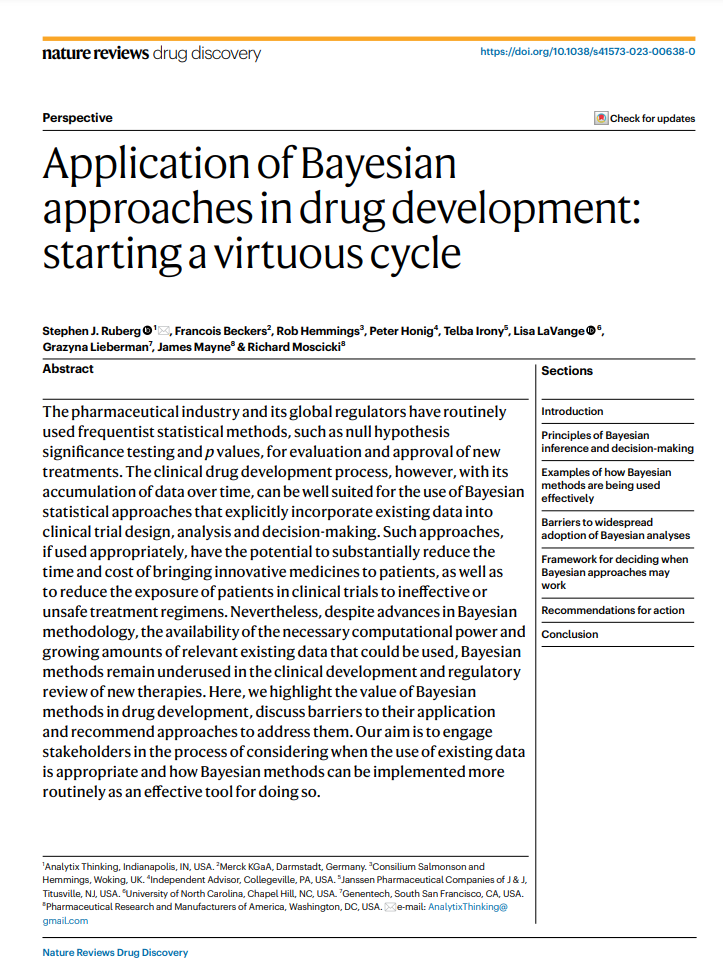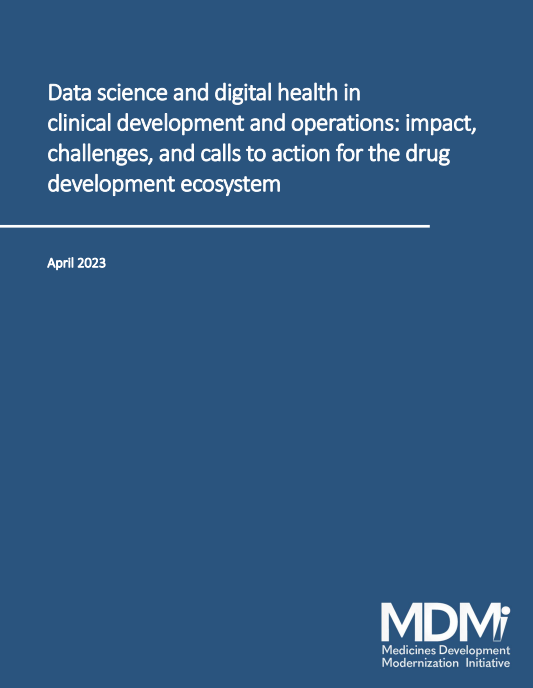LIITs or Innovation Teams
Strategic Initiatives
As detailed in the MDMI Roadmap, Strategic Initiatives are specific efforts to bring together the work of the various LIIT groups and the progress of other industry consortia to advance the comprehensive integration of MDTs and stakeholders at a programmatic level.
To learn more about our strategic initiatives, click here.
INNOVATION TEAMS
Biostatistics LIIT
The Biostatistics LIIT brings together multiple stakeholders and consortia to identify, establish, and execute on a new initiative to develop and implement a comprehensive strategy to improve the reliability of Bayesian statistical methods and the predictability of its regulatory acceptance.
Amongst its recent efforts and deliverables is the creation of a white paper on Bayesian methodology, which was recently published in Nature Reviews Drug Discovery. The white paper explains the importance and value of leveraging Bayesian methodology in drug development clinical trials to bring down the time and cost of drug development. To read the white paper, follow this link.
RWE LIIT
The RWE LIIT, which ended in Fall of 2021, brought together multiple stakeholders and consortia engaged in issues related to RWE. The objective of the RWE LIIT was to bring together the experiences and learnings of those stakeholders and consortia to develop a white paper that outlines a comprehensive strategy to improve the reliability of RWE and the predictability of its regulatory acceptance.
The RWE LIIT is also in the process of publishing a white paper on the current and potential use cases of RWE and strategies to overcoming barriers to the use of RWE in clinical development.
Data Sciences LIIT
The Data Sciences LIIT, which now encompasses the RWE LIIT, brings together multiple stakeholders and consortia engaged in issues related to the use of digital technologies in medicines development, including data science strategies that can support and advance the efficiency benefits of digital technologies.
The Data Sciences LIIT is in the process of developing a white paper on the areas where use of data sciences – such as tokenization and artificial intelligence – have been successful in optimizing the clinical development process, areas that may be ripe for the use of data sciences, and strategies to overcome barriers to their widespread use.
INNOVATION TEAMS
Biostatistics LIIT
The Biostatistics LIIT brings together multiple stakeholders and consortia to identify, establish, and execute on a new initiative to develop and implement a comprehensive strategy to improve the reliability of Bayesian statistical methods and the predictability of its regulatory acceptance.
Amongst its recent efforts and deliverables is the creation of a white paper on Bayesian methodology, which was recently published in Nature Reviews Drug Discovery. The white paper explains the importance and value of leveraging Bayesian methodology in drug development clinical trials to bring down the time and cost of drug development. To read the white paper, follow this link.
RWE LIIT
The RWE LIIT, which ended in Fall of 2021, brought together multiple stakeholders and consortia engaged in issues related to RWE. The objective of the RWE LIIT was to bring together the experiences and learnings of those stakeholders and consortia to develop a white paper that outlines a comprehensive strategy to improve the reliability of RWE and the predictability of its regulatory acceptance.
The RWE LIIT is also in the process of publishing a white paper on the current and potential use cases of RWE and strategies to overcoming barriers to the use of RWE in clinical development.
Data Sciences LIIT
The Data Sciences LIIT brings together multiple stakeholders and consortia engaged in issues related to digital health technologies, including artificial intelligence and machine learning, RWE, digital endpoints, and more. The objective of the Data Sciences LIIT is to engage key stakeholders and identify solutions to address outstanding challenges to the implementation of digital health tools in clinical development and achieve the full impact of MDTs.
In April 2023, the Data Sciences Innovation Team released a white paper on how three medicines development tools (MDTs) – artificial intelligence and machine learning algorithms, digital health tools, and augmentation of randomized controlled trial data with real-world data – can be applied to transform clinical development. To read the white paper, follow this link.
STRATEGIC INITIATIVES
As detailed in the MDMI Roadmap, Strategic Initiatives are specific efforts to bring together the work of the various LIIT groups and the progress of other industry consortia to advance the comprehensive integration of MDTs and stakeholders at a programmatic level.

Strategic Initiatives are intended to:
- demonstrate the use of MDTs in a particular disease state/patient population
- capable of extrapolation to additional disease states and patient populations
- demonstrate a meaningful reduction in the time and resources of medicines development and/or significant increase in the quality of therapeutics
- demonstrate the value and reliability of the relevant trial design strategies in a way that builds comfort and confidence among stakeholders (including regulators) in those strategies.
- provide value to each stakeholder group (patients, industry, payers, providers, etc.)
The success of the various Strategic Initiatives will be positioned and enhanced through the following four key strategies:
1
Achieve agreement and a shared understanding of stakeholder needs and expectations
2
Develop a framework for extrapolation to support methods by which narrow use cases can be applied in broader use cases


